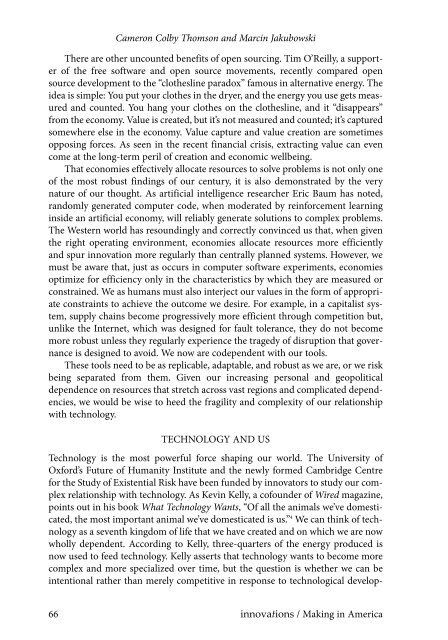Jakubowski-thomson
Jakubowski-thomson
Jakubowski-thomson
Create successful ePaper yourself
Turn your PDF publications into a flip-book with our unique Google optimized e-Paper software.
Cameron Colby Thomson and Marcin <strong>Jakubowski</strong><br />
There are other uncounted benefits of open sourcing. Tim O’Reilly, a supporter<br />
of the free software and open source movements, recently compared open<br />
source development to the “clothesline paradox” famous in alternative energy. The<br />
idea is simple: You put your clothes in the dryer, and the energy you use gets measured<br />
and counted. You hang your clothes on the clothesline, and it “disappears”<br />
from the economy. Value is created, but it’s not measured and counted; it’s captured<br />
somewhere else in the economy. Value capture and value creation are sometimes<br />
opposing forces. As seen in the recent financial crisis, extracting value can even<br />
come at the long-term peril of creation and economic wellbeing.<br />
That economies effectively allocate resources to solve problems is not only one<br />
of the most robust findings of our century, it is also demonstrated by the very<br />
nature of our thought. As artificial intelligence researcher Eric Baum has noted,<br />
randomly generated computer code, when moderated by reinforcement learning<br />
inside an artificial economy, will reliably generate solutions to complex problems.<br />
The Western world has resoundingly and correctly convinced us that, when given<br />
the right operating environment, economies allocate resources more efficiently<br />
and spur innovation more regularly than centrally planned systems. However, we<br />
must be aware that, just as occurs in computer software experiments, economies<br />
optimize for efficiency only in the characteristics by which they are measured or<br />
constrained. We as humans must also interject our values in the form of appropriate<br />
constraints to achieve the outcome we desire. For example, in a capitalist system,<br />
supply chains become progressively more efficient through competition but,<br />
unlike the Internet, which was designed for fault tolerance, they do not become<br />
more robust unless they regularly experience the tragedy of disruption that governance<br />
is designed to avoid. We now are codependent with our tools.<br />
These tools need to be as replicable, adaptable, and robust as we are, or we risk<br />
being separated from them. Given our increasing personal and geopolitical<br />
dependence on resources that stretch across vast regions and complicated dependencies,<br />
we would be wise to heed the fragility and complexity of our relationship<br />
with technology.<br />
TECHNOLOGY AND US<br />
Technology is the most powerful force shaping our world. The University of<br />
Oxford’s Future of Humanity Institute and the newly formed Cambridge Centre<br />
for the Study of Existential Risk have been funded by innovators to study our complex<br />
relationship with technology. As Kevin Kelly, a cofounder of Wired magazine,<br />
points out in his book What Technology Wants, “Of all the animals we’ve domesticated,<br />
the most important animal we’ve domesticated is us.” 4 We can think of technology<br />
as a seventh kingdom of life that we have created and on which we are now<br />
wholly dependent. According to Kelly, three-quarters of the energy produced is<br />
now used to feed technology. Kelly asserts that technology wants to become more<br />
complex and more specialized over time, but the question is whether we can be<br />
intentional rather than merely competitive in response to technological develop-<br />
66 innovations / Making in America


